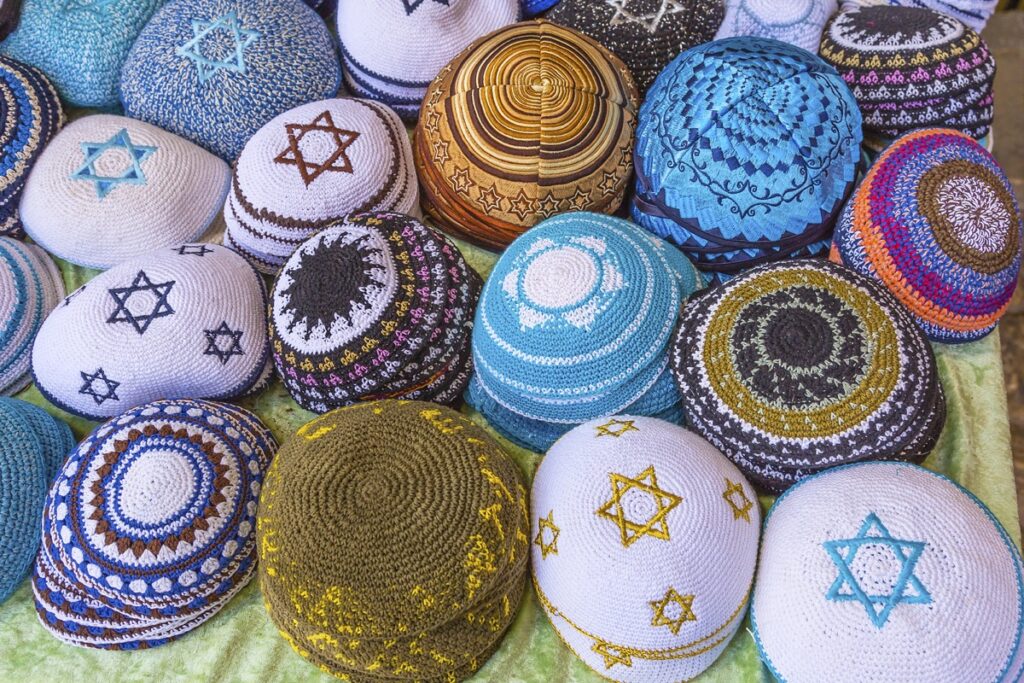Jewish funerals are solemn and respectful occasions. Dressing appropriately is essential to show respect for the deceased, their family, and the traditions of the Jewish faith. Below are guidelines on what to wear to a Jewish funeral for men, women, children, and non-Jews.
What Men Should Wear to a Jewish Funeral:
- Dark Colors: Men should wear dark, conservative colors such as black, navy, or dark gray. These colors symbolize mourning and reflect the seriousness of the occasion.
- Suits or Dress Slacks: A suit or dress slacks with a button-down shirt is typically expected. Ties are generally appropriate but not mandatory in more casual or Reform settings.
- Yarmulke/Kippah: Jewish men wear a yarmulke (also called a kippah) during religious services, including funerals. It is a small, rounded cap traditionally worn by Jewish men and boys as a sign of reverence and respect. They are usually provided by synagogues or funeral homes at most Jewish end-of-life events.
- Footwear: Dress shoes should be worn, and casual footwear like sneakers or sandals is inappropriate.
What Women Should Wear to a Jewish Funeral::
- Modest Attire: Women should wear modest clothing, meaning garments that cover the shoulders and are not revealing. Skirts or dresses should ideally fall below the knee.
- Dark, Neutral Colors: Like men, women should wear dark, subdued colors to signify mourning. Avoid bright colors or flashy patterns.
- Head Covering: In some Jewish communities, particularly Orthodox, it is customary for married women to cover their heads with a scarf, hat, or other head covering. This may not be required for non-Jewish women or in less traditional communities, but it’s a good idea to have a scarf on hand just in case.
- Footwear: Conservative footwear is appropriate, with low heels or flats being preferred.
- It’s acceptable for women to opt for a trouser suit (slacks and a top). Lighter colors can also be worn. Plain fabric as opposed to patterned is more common.
What Children Should Wear to a Jewish Funeral:
- Simple and Modest Clothing: Children attending a Jewish funeral should dress in simple, modest clothing. Boys can wear dress slacks and a button-down shirt, and girls should wear a modest dress or skirt and blouse.
- Dark Colors: Even for children, darker colors like black, gray, or navy are preferable. Avoid bright colors or casual wear like T-shirts and jeans.
- Head Covering for Boys: Boys, whether Jewish or not, should wear a yarmulke (kippah) during the service, which is often provided if they don’t own one.
What Should Non-Jews Wear to a Funeral:
- Similar Guidelines to Jews: Non-Jews attending a Jewish funeral should follow similar dress codes as those outlined for Jewish attendees—dark, conservative clothing, modest attire, and avoiding anything too casual or bright.
- Yarmulke/Kippah for Men: While non-Jewish men are not required to wear a yarmulke, it is customary and considered respectful to do so, especially in more traditional or Orthodox settings. The synagogue or funeral home usually provides yarmulkes for guests.
- Head Covering for Women: Non-Jewish women are not generally expected to cover their heads unless they are attending a more traditional service where this might be customary. Having a scarf available is a respectful precaution.
Cultural Sensitivity and Modesty
Modesty is an important value in Jewish funeral customs. Dressing conservatively not only shows respect for the deceased and their family but also reflects Jewish principles of humility, especially during solemn events. Funerals focus on honoring the life of the deceased in a humble and quiet way, and simple, dark attire aligns with that goal.
Shiva and Mourning Customs
In addition to attending the funeral, you may also be invited to a Shiva—a period of mourning where friends and family visit the home of the mourners to offer condolences. Clothing for Shiva visits should follow similar guidelines to funeral attire, though it can be slightly less formal. Dark, modest, and conservative clothing is still appropriate, but casual attire like sweaters and slacks is acceptable in this more informal setting.
Accessories and Behavior
- Minimal Accessories: It’s important to avoid wearing flashy or ostentatious accessories. Simple jewelry, modest scarves, and neutral handbags are more appropriate than bright or decorative items. Avoid anything that could distract from the solemnity of the occasion.
- Behavior: In addition to dressing appropriately, be mindful of your behavior during the funeral. Jewish funerals are usually quiet and respectful. Avoid speaking loudly or using your phone. Non-Jewish customs such as bringing flowers are not typical at Jewish funerals, so it’s best to refrain from doing so unless the family explicitly requests it.
Funerals on Holy Days (Sabbath, Holidays)
Jewish funerals rarely take place on Shabbat (the Jewish Sabbath) or on major Jewish holidays. However, if you attend a funeral on a Friday, be aware that Shabbat begins at sundown, which may affect the timing of the service and subsequent gatherings. In this case, it’s important to plan your attire and travel accordingly, especially if you will be in a more traditional Jewish community.
Cultural and Denominational Differences
The guidelines for what to wear at a Jewish funeral can vary slightly depending on the community. Orthodox funerals are typically the most traditional, with stricter guidelines for modest dress and head coverings. Conservative and Reform Jewish communities may be slightly more relaxed, but modesty and respect are always key. If in doubt, it’s always a good idea to check with the family or the funeral home.
Seating and Gender Segregation at Orthodox Funerals
For those attending an Orthodox Jewish funeral, it’s helpful to know that there may be gender-segregated seating, with men and women sitting separately. While this does not directly impact what you wear, understanding this structure can help avoid confusion upon arrival. Simply follow the seating arrangement as directed by the synagogue or funeral home staff.

